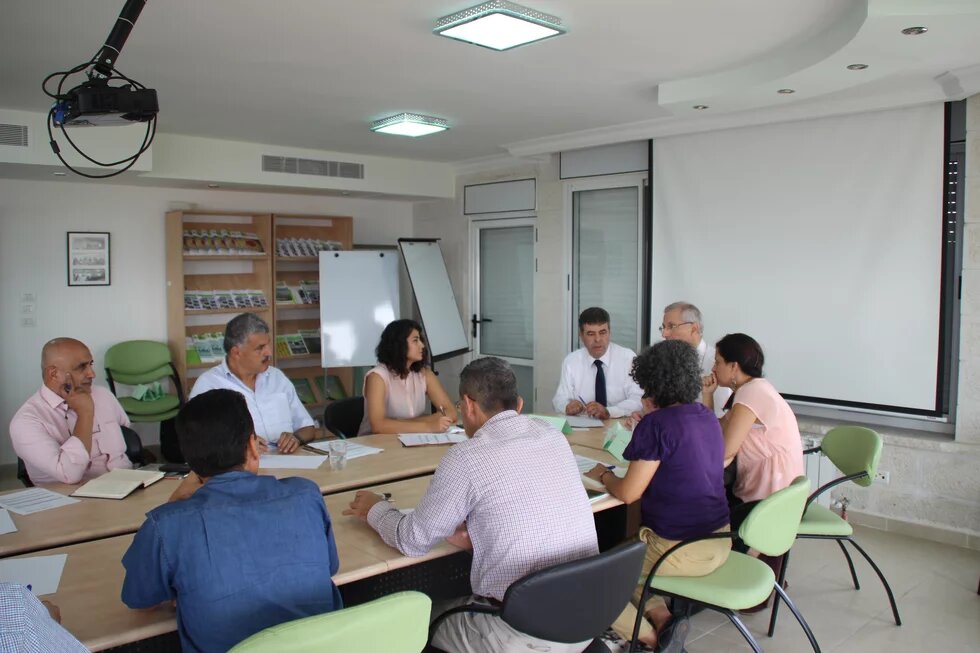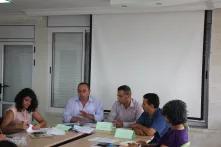
Policy Dialogue on Food Sovereignty in Palestine
On 7 September 2015, Heinrich Böll Foundation’s Palestine & Jordan office invited the main Palestinian actors and experts in the environmental field to a policy dialogue titled “Food Sovereignty in Palestine”. The aim of the policy dialogue was to discuss the challenges before local agriculture in Palestine and the influence of the agricultural policies and projects on the Palestinian market. The experts and representatives of Palestinian civil society organizations and ministries came up with recommendations at the end of the dialogue to improve the situation of the Palestinian agriculture and market
The policy dialogue was divided into two sessions. The first session was about local farming- current situation/ challenges. The speakers of this session were Mr. Abdullah Lahlouh, Ministry of Agriculture; Mr. George Kurzom, MA’AN Development Center; and Ms. Vivian Sansour. Mr. Lahlouh started the session by emphasizing on the importance of agriculture for real development in Palestine through empowering the Palestinian farmers and local farming. He explained that local agriculture in Palestine had been drastically affected by the Israeli policies such as land confiscation, control over water resources, lack of water provided to Palestinians, building separation wall in the West Bank, and forcing a military siege on the Gaza Strip. Mr. Lahlouh added that the Ministry of Agriculture (MoA) developed a strategy for agriculture along with the Palestinian stakeholders, aiming to improve the local agricultural sector.
Mr. George Kurzom explained that there were other factors that ruined the local agriculture. Many Palestinian farmers were encouraged to focus on agricultural products that could be exported to the global market to increase their income. This resulted in producing less agricultural products for the needs of the local people. Furthermore, many Palestinian agricultural lands were being confiscated for joint agricultural/industrial projects between Israel and Palestine, aiming at increasing profit of both sides. Also, many global agricultural products were subsidized and imported to the Palestinian market. This resulted in drastic decrease in the local production of the necessary agricultural products to the local needs, dependency on the global market to import the necessary products for the local market, and dependency on Israeli companies to obtain seeds for agriculture that are not organic but GOMs.
Ms. Vivien Sansour said that globalization played a big role damaging agriculture in Palestine as well as signing Paris Protocol with Israel that increased the Palestinian economic dependency on Israel. She added that depending on Israel to obtain GOM seeds had further ruined the Palestinian agricultural legacy and products. Ms. Sansour emphasized on using the available resources to support the local agriculture and produce organic products instead of GOMs.
The second session was about the influence of policies and projects on the Palestinian agricultural market. The speakers of the session were Mr. Ziad Abdulrahman, Ministry of Economy; Mr. Fuad Abu Seif, Union of Agricultural Work Committees; and Mr. Sa’ad Dagher. Mr. Ziad Abdulrahman mentioned that the Ministry of Economy (MoE) had developed a draft law that aimed to protect the local agricultural and industrial products. He added that there was an improvement in the local production, especially in the industrial production such as paper and plastic. Mr. Fuad Abu Seif added that the Palestinian agriculture and market was influenced by the policies of the World Bank and the funding policies of donors. He explained that the Palestinian civil society singed a statement and submitted it to the donors, encouraging them to change their funding policies to further support the local agriculture. Mr. Sa’ad Dagher agreed with Mr. Kurzom that many farmers focus on agricultural products that could be exported to the global market. In addition, the Palestinian farmers depend on Israel to obtain GOM seeds and agricultural pesticides which both are dangerous on the local agriculture. Unfortunately, Palestinians do not have sovereignty on land and water resources, leading to continuous decrease in local organic production and increased dependency on Israel.
The participants along with the speakers recommended some recommendations that might help to improve the local agriculture. These recommendations are: form a national committee that brings the Palestinian actors together to find initiatives that support Palestinian agriculture; establish a national strategic plan that protects the local agriculture and farmers; stop the joint agricultural/industrial projects; adopt organic agriculture and stop using GOM seeds and agricultural pesticides; raise the awareness of the Palestinian society on food sovereignty and their important role supporting local agriculture through using their backyards to produce variety of organic products; improve the organic seed bank; and divide State agricultural lands among farmers to increase the local organic products.














